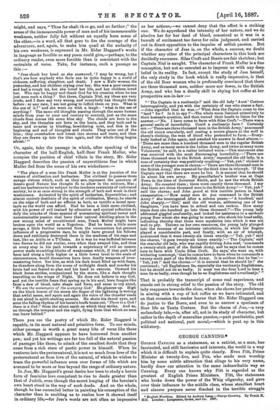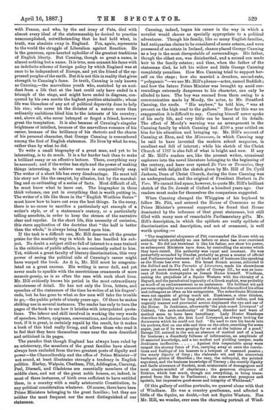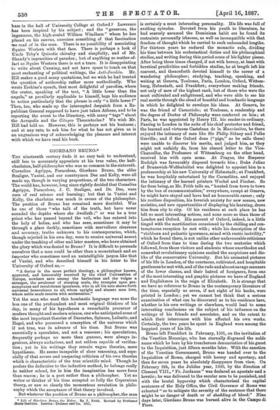GEORGE CANNING.* GEORGE Comma as a statesman, as a satirist,
as a man, haw fascinated, and still fascinates and interests, the world in a way which it is difficult to explain quite clearly. Even Pitt, Prime Minister at twenty-five, and Fox, who made men worship him by some subtle attraction that clings to his very name, hardly draw our attention in the same indescribable way as Canning. Every one knows why Pitt is regarded as the greatest of English Prime Ministers. Pitt, the statesman who broke down the power of the Whig oligarchy, and gave over their influence to the middle class, whose steadfast heart and sincere purpose never flinched in the terrible struggle
• English Worthies. Edited by Andrew Lang.—Gsergs Canning. By Frank H. Hill. London Longman', Green, and Co. 1087.
with France, and who, by the sad irony of Fate, died with almost every ideal of the statesmanship he desired to practise nnaccomplished, notwithstanding that he had held what, in truth, was absolute sway in England. Fox, again, represents to the world the struggle of Liberalism against Reaction. He is the generous, open-hearted upholder of the greatest traditions of English liberty. But Canning, though so great a name, is almost nothing but a name. It is true, men connect his fame with an indefinite scheme of foreign policy by which England was at once to be independent of Europe, and yet the friend of the op- pressed peoples of the earth. But it is not this in reality that gives strength to Canning'e fame. In truth, Canning is only known as Canning,—the marvellous youth who, snatched by an acci- dent from a life that at the best could only have ended in a triumph of the stage, and might have ended in disgrace, con- quered by his own merits the highest position attainable; whose life was blameless of any act of political depravity done to help his rise; who never let the dictates of a nature more than ordinarily ambitions blind him to the interests of his country ; and, above all, who never betrayed or forgot a friend, however great the temptation. It is also because of Canning's singular brightness of intellect, because of the marvellous romance of his career, because of the brilliancy of his rhetoric and the charm of his personal character, that George Canning is remembered among the first of English statesmen. He lives by what he was, rather than by what he did.
To write a small biography of a great man, and yet to be interesting, is to do much. It is a far harder task than to make a brilliant essay or an effective lecture. There, everything may be assumed; and if the writer has style and the power of making things interesting, to achieve success is comparatively easy. The writer of a short life has every disadvantage. He must tell his story not like the essayist, by allusion, but by the marshal- ling and co-ordinating of a series of facts. Most difficult of all, he must know what to leave out. The biographer in three thick volumes, can put in everything that is worth putting in. The writer of a life like those in the "English Worthies Series" must know how to leave out even the best things. In the essay, there is no cause to sacrifice a particularly apt example of a writer's style, or of a statesman's oratory, or a particularly telling anecdote, in order to keep the stream of the narrative clear and regular. In the short life, this necessity of omission, this stern application of the doctrine that "the half is better than the whole," is always being forced upon him.
If the task is a difficult one, Mr. Hill deserves all the greater praise for the masterly way in which he has handled his sub- ject. No doubt a subject still so full of interest to a man trained in the criticism of public affairs, is one eminently suited to him. Yet, without a great faculty of literary discrimination, this very power of seeing the political side of Canning's career might have warped the book. As it is, Mr. Hill must be congratu- lated on a great success. His writing is never dull, and yet never made to sparkle with the meretricious ornaments of mere memoir-gossip, as is so often the case with such short lives. Mr. Hill evidently knows his period in the most extraordinary minuteness of detail. He has not only the lives, letters, and speeches of the statesmen of the time he writes of at his fingers'. ends, but he has gone to what so few men will take the trouble to go,—the public prints of ninety years ago. Of these he makes striking use in several instances. The reader has only to turn the pages of the book to see how it bristles with interpolated quota- tions. The labour and skill involved in working the very words of speeches, letters, epigrams, conversations, and stories into the text, if it is great, is certainly repaid by the result, for it makes a book of this kind really living, and allows those who read it to feel that they have themselves come near the men described and criticised in its pages.
The paradox that though England has always been ruled by an aristocracy, the members of the great families have almost always been excluded from the two greatest posts of dignity and power—the Chancellorship and the office of Prime Minister—if not sound, at least illustrates strongly a tendency in English politics. Harley, Walpole, Chatham, Pitt, Addington, Canning, Peel, Disraeli, and Gladstone are essentially members of the middle class, and not of the great noble houses, or, indeed, in most of these instances, of birth even sufficient to have entitled them, in a country with a really aristocratic Constitution, to any political consideration whatever. Of course, there have been Prime Ministers belonging to the great families ; but they are neither the most frequent nor the most distinguished of our statesmen.
Canning, indeed, began his career in the way in which a novelist would choose as specially appropriate to a political adventurer. Though his family, like so many English families,
had antiquarian claims to be considered of some esteem, and were possessed of an estate in Ireland, chance placed George Canning as a boy in the most disreputable of surroundings. His father, though the eldest son, was disinherited, and a second eon made heir to the family estates ; and thus, when the father of the statesman died, he left his widow and little George Canning completely penniless. How Mrs. Canning tried to support her- self on the stage; how she married a drunken, second-rate, " polygamic "—we use Mr. Hill's phrase—actor, named Reddish; and how the future Prime Minister was brought up amid sur- roundings extremely dangerous to his character, can only be alluded to here. The boy was rescued from them owing to a communication made by Moody, the actor, to Mr. Stratford Canning, the uncle. " His nephew," he told him, " was at present on the high road to the gallows." How far this was an exaggeration it is difficult to say. Canning himself never spoke of his early life, and very little can be learnt of its details. The effect of Moody'e warning was an arrangement in the Canning family by which Canning had 2.200 a year settled on him for his education and bringing up. Mr. Hill's account of Canning at Eton, and the Microeoem, in which Canning may be said to have invented the modern school magazine, is excellent and full of interest ; while his sketch of the Christ Church of 1787 is also full of what is bright and new. If any of Mr. Hill's readers are, like the present writer, occasional explorers into the novel literature belonging to the beginning of the century, and have ever opened De Vera or Tremaime, they will hail with delight the sketch given by Mr. Hill of Dr. Cyril Jackson, Dean of Christ Church, during the time Canning was an undergraduate, and the original of President Herbert in Do Vera. We cannot find space, however, to quote Mr. Hill's brilliant sketch of the Dr. Jewett of Oxford a hundred years ago. Our readers must make for themselves the comparison suggested.
When Canning changed the Whiggism of his boyhood to follow Mr. Pitt, and entered the House of Commons as the Prime Minister's personal supporter, he found that House dominated by the influence of that great statesman, but still filled with many men of remarkable Parliamentary gifts. Mr. Hill's description, in which the epithets are really epithets of discrimination and description, and not of ornament, is well worth quoting :— "The magisterial eloquence of Pitt commanded the House with an authority whioh probably no one before or since has ever exercised over it. He did not browbeat it like his father, nor show his power, as subsequent Ministers have done, by controlling the storms which they have raised. His authority was equal and constant. He was powerfully seconded by Dander', probably as great a master of official and Parliamentary business of all kinds and of business-like speaking as the House has ever seen. His broad Scotch accent, ridiculed in the Roliiad and in The Pursuits of Literature, made his shrewdness seem yet more shrewd, and in spite of George III., he was as inno- cent of Scotch metaphysics as Joseph Hume himself. Windham, uniting the prejudices of a Squire Western with the chivalry of a Bayard, and the paradoxical ingenuity of a Greek sophist, was probably as much of an embarrassment as an assistance. His brilliant wit and perverse originality were ornaments of debate, but discomfited his allies and colleagues as often as his antagonists. The subordinate Ministers were not capable of giving much aid. Huskisson, a clear thinker, was at that time, and for long after, an embarrassed talker, and his ungainly manner and provincial accent displeased the eye and ear of the House. In Jenkinson, afterwards 'the pink-nosed Liverpool' of Gobbet, 'the arch-mediocrity' of Disraeli, disorder and want of method seem to have been hereditary. Lady Hester Stanhope describes his father, the first Lord Liverpool, as always looking for documents which he could not find. He used to ram his hands into his pockets, first on one side and then on the other, searching for some paper, just as if he were groping for an eel at the bottom of a pond.' George III. noticed in the son an absence of method and of a head for business ; a disorderly fullness of information, an amplitude of ill-assorted knowledge, and a too modest and yielding temper, made Jenkinson ineffective Against this respectable array were ranged the stormy force of Fox, carrying away at once the °envie- clews and feelings of his hearers in a tempest of reasoned passion ; the manly dignity of Grey; the elaborate wit and the somewhat harlequin glitter of Sheridan ; the easy, the colloquial, the pointed argument, and the business knowledge of Tierney ; the courtly dignity and facile utterance of Burdett, most aristocratic of demagogues and most simpleminded of charlatans ; the generous eloquence of Erskine, which lost much, though not everything, in being trans- ported from the Bar to Parliament ; the somewhat pompous and egoistic, but impressive good-sense and integrity of Whitbread."
Of this gallery of outline portraits, we quarrel alone with that of Windham. He was a country gentleman, and affected a little of the Squire, no doubt,—but not Squire Western. Has Mr. Hill, we wonder, ever seen the charming portrait of Wind- ham in the hall of University College at Oxford ? Lawrence has been inspired by his subject ; and the "generous, the ingenuous, the high-souled William Windham" whom he has placed on his canvas, exercises something of that fascination ere read of in the man. There is no possibility of associating Squire Western with that face. There is perhaps a look of Uncle Toby's Quixotic chivalry and simplicity, and of Mr. Shandy's ingennities of paradox ; but of anything so matter-of- fact as Squire Western there is not a trace. It is disappointing to write about Canning, and not have space to touch on that most enchanting of political writings, the Anti-Jacobin. Mr. Hill makes a good many quotations, hut we wish he had treated the question of authorship rather more methodically. Who wrote Erekine's speech, that most delightful of parodies, where the orator, speaking of the text, "A little lower than the angels," as peculiarly applicable to himself, begs his audience to notice particularly that the phrase is only "a little lower ?" Then, too, who made up the intercepted despatch from a Re- publican General supposed to have just taken Athena, and to be reporting the event to the Directory, with many " tags " about the Acropolis and the Citoyen Themistocles P We wish Mr. Hill had told ns. However, this is perhaps not his business ; and at any rate, to ask him for what he has not given us is an ungracious way of acknowledging the pleasure and interest +with which we have read his book.




































 Previous page
Previous page